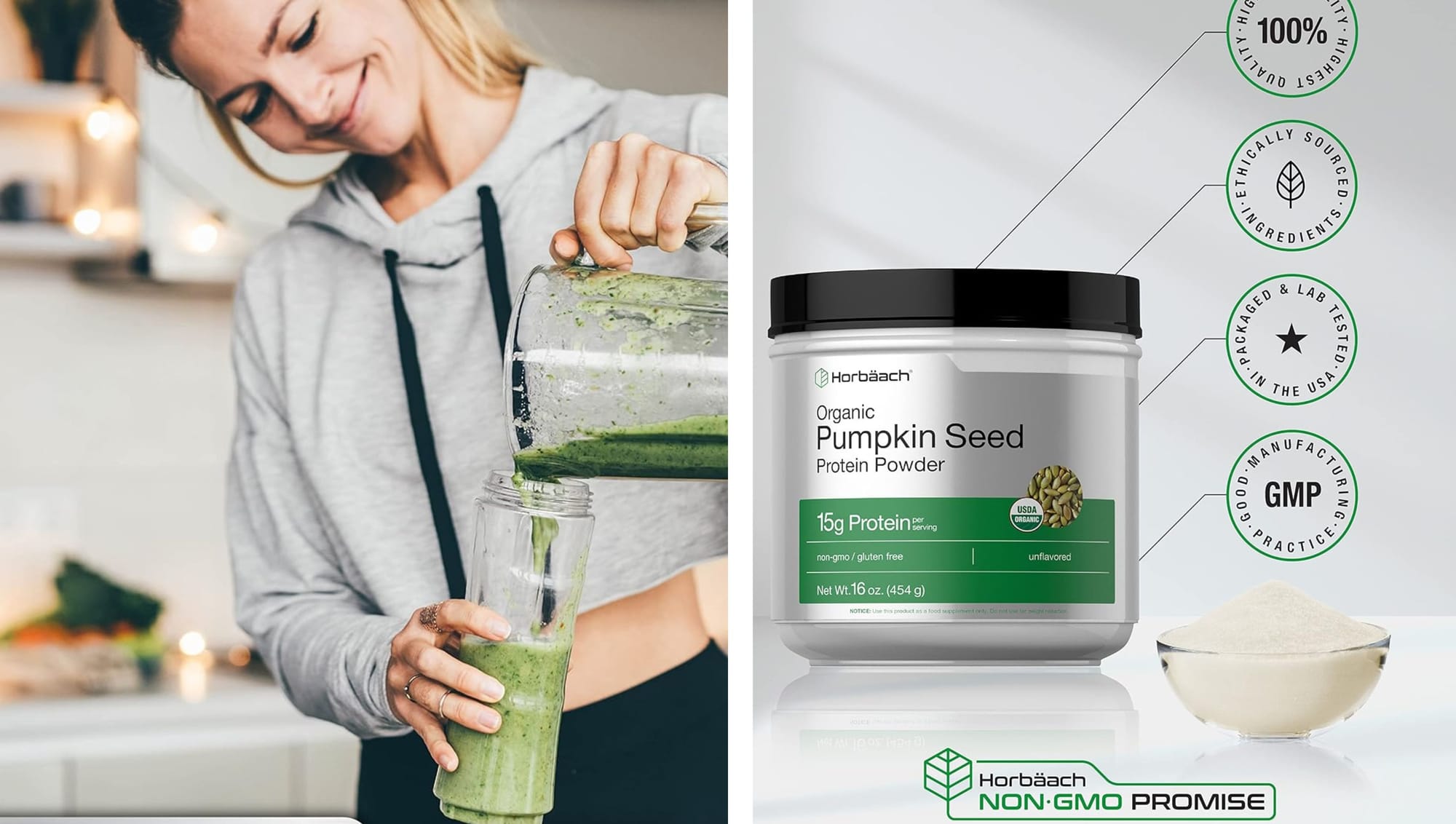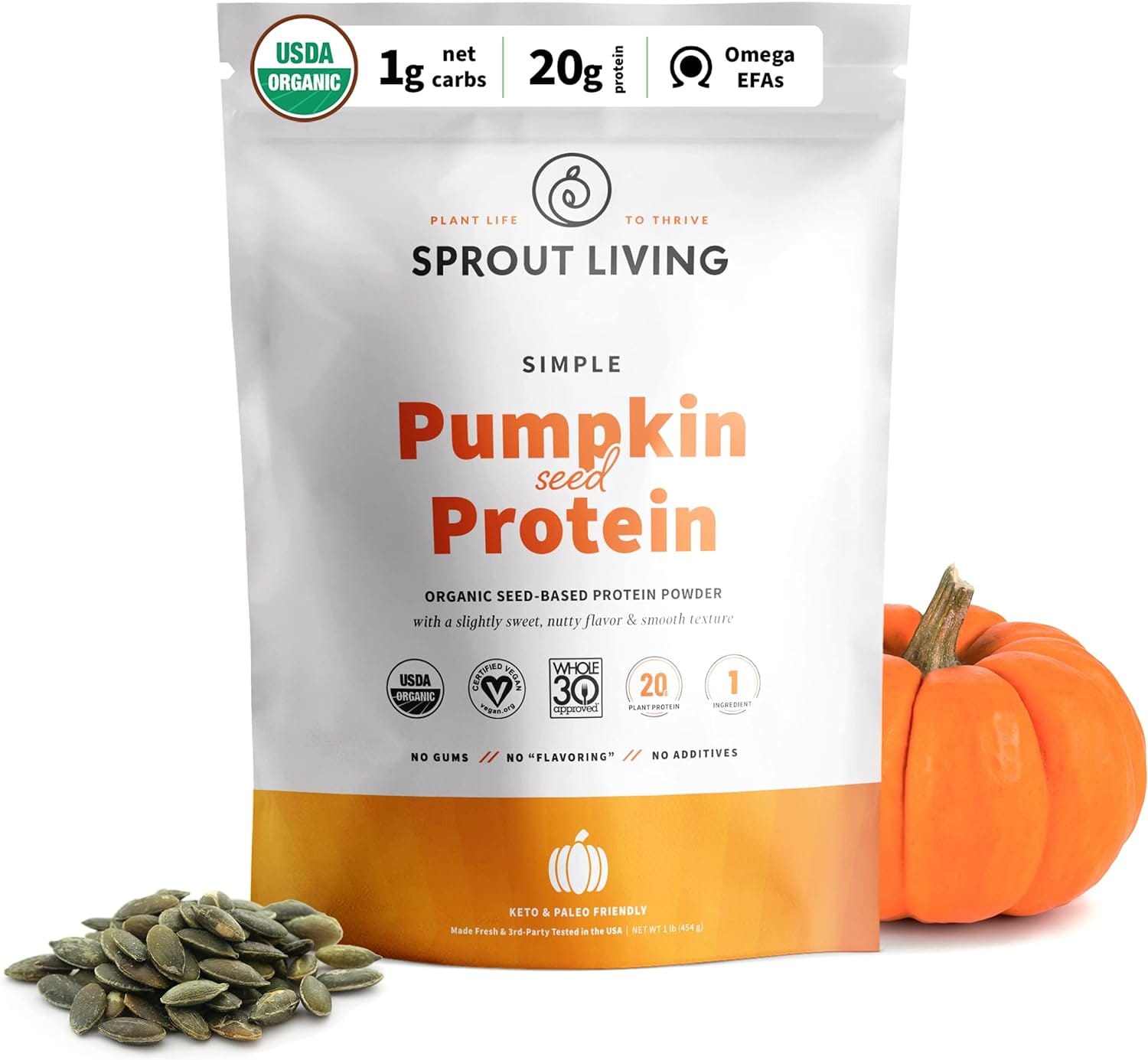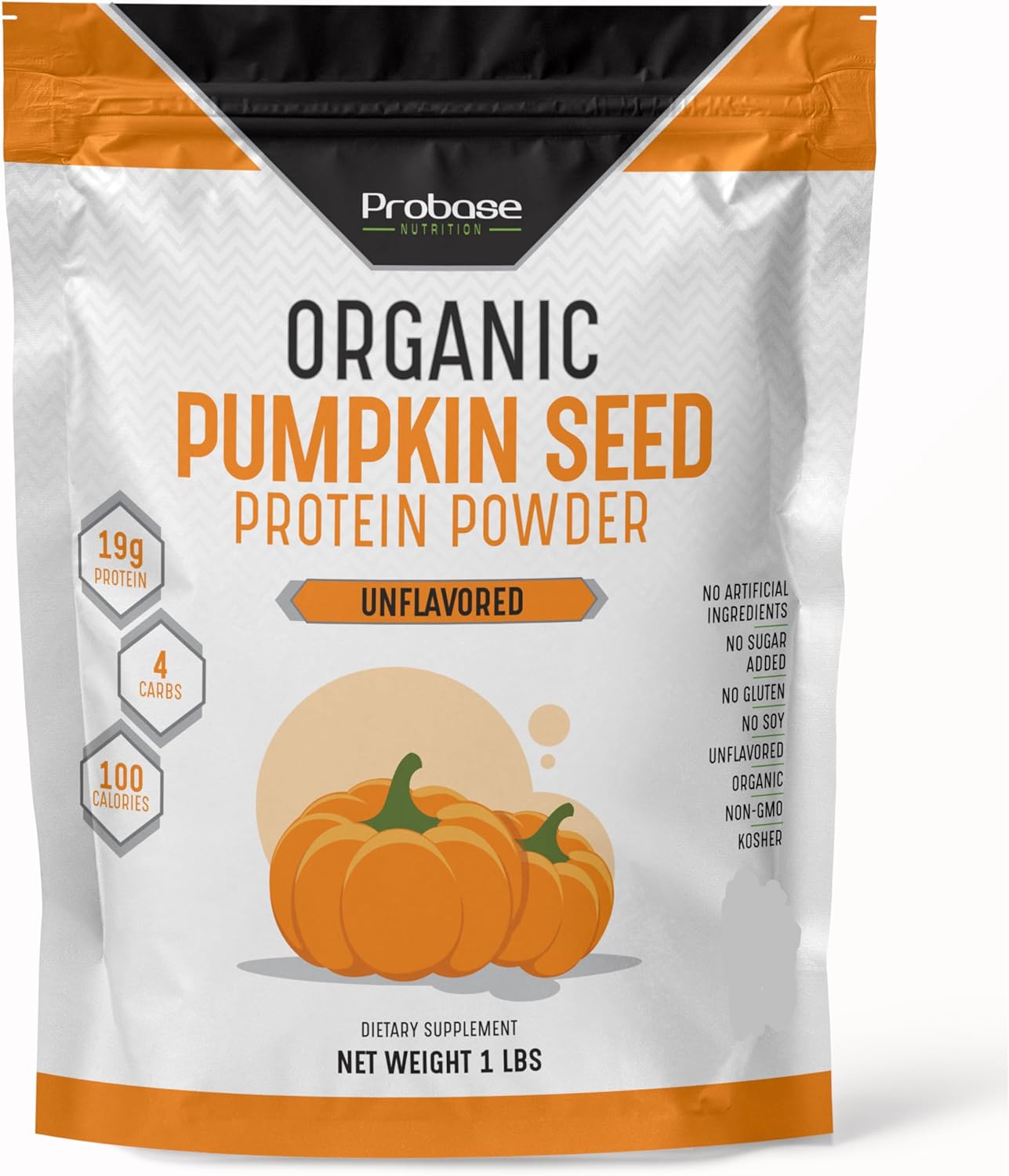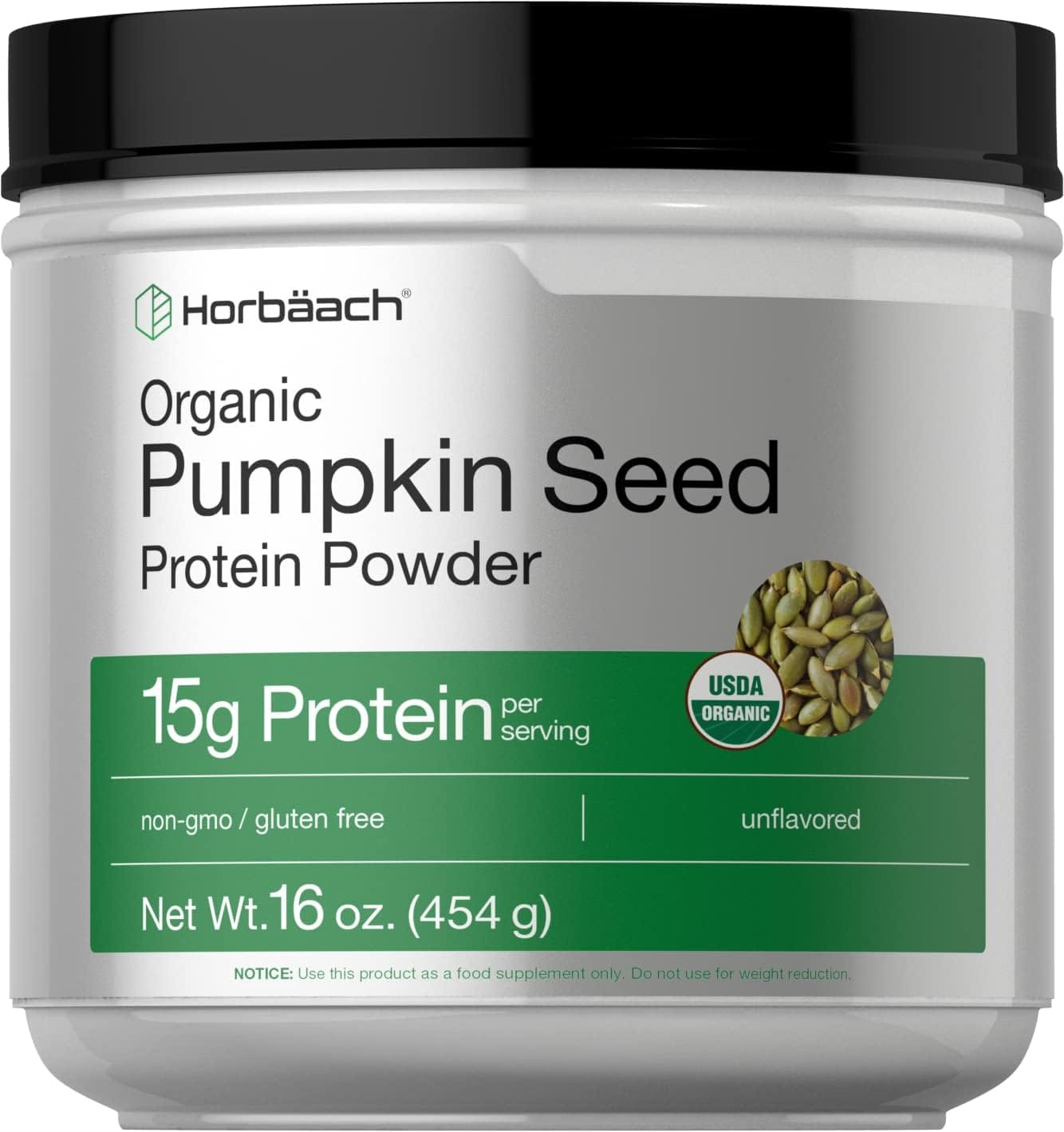Discover Pumpkin Seed Protein: Your Go-To for Plant-Based Power and Nutritional Boost!
Packed with essential amino acids, it provides a powerful protein boost for muscle growth, recovery, and overall wellness.

Key Takeaways:
- Pumpkin Seed Protein is a nutrient-dense, plant-based protein source.
- It offers numerous health benefits, including muscle growth, heart health, and improved digestion.
- Incorporating Pumpkin Seed Protein into your diet is simple and versatile.
What is Pumpkin Seed Protein?
Pumpkin Seed Protein is derived from the seeds of pumpkins, specifically the Cucurbita pepo species. These seeds are processed to extract the protein, resulting in a powder that is rich in essential nutrients. This plant-based protein source is gaining popularity due to its high protein content and numerous health benefits.
Unlike animal-based proteins, Pumpkin Seed Protein is suitable for vegetarians and vegans. It is also hypoallergenic, making it an excellent choice for individuals with food sensitivities or allergies. The protein powder is typically greenish-brown and has a slightly nutty flavor, which can be easily incorporated into various recipes.
Nutritional Profile of Pumpkin Seed Protein
Pumpkin Seed Protein is a powerhouse of nutrients. It contains all nine essential amino acids, making it a complete protein source. This is particularly beneficial for those following a plant-based diet, as complete proteins are often harder to come by in non-animal sources.
In addition to protein, pumpkin seeds are rich in healthy fats, fiber, vitamins, and minerals. They are an excellent source of magnesium, zinc, iron, and potassium. These nutrients play crucial roles in maintaining overall health, from supporting immune function to promoting heart health.
Health Benefits of Pumpkin Seed Protein
One of the standout benefits of Pumpkin Seed Protein is its ability to support muscle growth and repair. The high protein content helps in building and maintaining muscle mass, which is essential for athletes and fitness enthusiasts. Additionally, the amino acids in pumpkin seeds aid in muscle recovery post-exercise.
Pumpkin Seed Protein also promotes heart health. The seeds are rich in magnesium, which helps regulate blood pressure and supports cardiovascular function. The healthy fats in pumpkin seeds, including omega-3 and omega-6 fatty acids, further contribute to heart health by reducing inflammation and improving cholesterol levels.
Pumpkin Seed Protein and Digestion
Pumpkin Seed Protein is not only nutritious but also easy on the digestive system. The fiber content in pumpkin seeds aids in digestion and helps maintain a healthy gut. Fiber adds bulk to the stool, promoting regular bowel movements and preventing constipation.
Moreover, Pumpkin Seed Protein contains enzymes that assist in breaking down food, making it easier for the body to absorb nutrients. This can be particularly beneficial for individuals with digestive issues or those looking to improve their gut health.
How to Incorporate Pumpkin Seed Protein into Your Diet
Incorporating Pumpkin Seed Protein into your diet is simple and versatile. The protein powder can be added to smoothies, shakes, and juices for a quick and nutritious boost. It can also be mixed into oatmeal, yogurt, or cereal for a protein-packed breakfast.
For those who enjoy baking, Pumpkin Seed Protein can be used as an ingredient in muffins, pancakes, and protein bars. Its slightly nutty flavor complements both sweet and savory dishes, making it a versatile addition to any meal.
Pumpkin Seed Protein vs. Other Plant-Based Proteins
When compared to other plant-based proteins, Pumpkin Seed Protein stands out for its complete amino acid profile. While proteins like pea and rice protein are also popular, they often lack one or more essential amino acids. Pumpkin Seed Protein, on the other hand, provides a balanced profile of all nine essential amino acids.
Additionally, Pumpkin Seed Protein is less likely to cause digestive issues compared to other plant-based proteins like soy. Soy protein can sometimes lead to bloating and gas, whereas Pumpkin Seed Protein is generally well-tolerated by most individuals.
Pumpkin Seed Protein for Weight Management
Pumpkin Seed Protein can be a valuable tool for weight management. The high protein content helps increase satiety, reducing overall calorie intake. Protein takes longer to digest than carbohydrates, keeping you fuller for longer and curbing unnecessary snacking.
Furthermore, the fiber in Pumpkin Seed Protein aids in weight management by promoting a feeling of fullness and stabilizing blood sugar levels. This can help prevent overeating and support healthy weight loss or maintenance.
Pumpkin Seed Protein and Immune Support
The nutrients in Pumpkin Seed Protein play a significant role in supporting the immune system. Zinc, in particular, is crucial for immune function and helps the body fight off infections. Pumpkin seeds are one of the best plant-based sources of zinc, making Pumpkin Seed Protein an excellent choice for immune support.
Additionally, the antioxidants in pumpkin seeds, such as vitamin E, help protect the body from oxidative stress and inflammation. This further supports overall immune health and reduces the risk of chronic diseases.
Pumpkin Seed Protein for Bone Health
Pumpkin Seed Protein is beneficial for bone health due to its high magnesium content. Magnesium is essential for bone formation and helps maintain bone density. Adequate magnesium intake can reduce the risk of osteoporosis and other bone-related conditions.
Moreover, the protein in pumpkin seeds supports bone health by providing the necessary building blocks for bone tissue. Consuming Pumpkin Seed Protein can help maintain strong and healthy bones, especially as we age.
Pumpkin Seed Protein and Heart Health
The heart health benefits of Pumpkin Seed Protein are noteworthy. The magnesium in pumpkin seeds helps regulate blood pressure, reducing the risk of hypertension. Additionally, the healthy fats in pumpkin seeds, including omega-3 and omega-6 fatty acids, support cardiovascular health by lowering bad cholesterol levels and increasing good cholesterol.
Furthermore, the antioxidants in Pumpkin Seed Protein help reduce inflammation, a key factor in heart disease. Incorporating Pumpkin Seed Protein into your diet can contribute to a healthier heart and lower the risk of cardiovascular issues.
Pumpkin Seed Protein for Skin Health
Pumpkin Seed Protein can also benefit your skin. The zinc in pumpkin seeds helps maintain healthy skin by regulating oil production and reducing inflammation. This can be particularly beneficial for individuals with acne-prone skin.
Additionally, the antioxidants in Pumpkin Seed Protein, such as vitamin E, protect the skin from damage caused by free radicals. This helps prevent premature aging and keeps the skin looking youthful and radiant.
Pumpkin Seed Protein and Hair Health
The nutrients in Pumpkin Seed Protein can promote healthy hair growth. Zinc plays a crucial role in hair tissue growth and repair, while the protein provides the necessary building blocks for strong and healthy hair. Consuming Pumpkin Seed Protein can help prevent hair loss and improve overall hair health.
Moreover, the healthy fats in pumpkin seeds nourish the scalp and hair follicles, promoting shiny and lustrous hair. Incorporating Pumpkin Seed Protein into your diet can contribute to healthier, more vibrant hair.
Pumpkin Seed Protein for Mental Health
Pumpkin Seed Protein can also support mental health. The magnesium in pumpkin seeds helps regulate neurotransmitters, which are essential for mood and mental well-being. Adequate magnesium intake can reduce symptoms of anxiety and depression.
Additionally, the tryptophan in pumpkin seeds is a precursor to serotonin, a neurotransmitter that regulates mood and sleep. Consuming Pumpkin Seed Protein can help improve mood, reduce stress, and promote better sleep quality.
Pumpkin Seed Protein and Athletic Performance
Athletes and fitness enthusiasts can benefit greatly from Pumpkin Seed Protein. The high protein content supports muscle growth and repair, while the amino acids aid in muscle recovery post-exercise. This can enhance athletic performance and reduce the risk of injury.
Moreover, the magnesium in Pumpkin Seed Protein helps maintain energy levels and supports muscle function. Consuming Pumpkin Seed Protein can improve endurance, strength, and overall athletic performance.
Pumpkin Seed Protein for Diabetes Management
Pumpkin Seed Protein can be a valuable addition to a diabetes management plan. The fiber in pumpkin seeds helps regulate blood sugar levels by slowing down the absorption of sugar into the bloodstream. This can prevent spikes and crashes in blood sugar levels, which are common in diabetes.
Additionally, the magnesium in Pumpkin Seed Protein plays a role in insulin regulation and glucose metabolism. Consuming Pumpkin Seed Protein can help manage blood sugar levels and reduce the risk of complications associated with diabetes.
Pumpkin Seed Protein and Hormonal Balance
Pumpkin Seed Protein can support hormonal balance, particularly in women. The zinc in pumpkin seeds helps regulate hormone levels and supports reproductive health. This can be beneficial for women experiencing hormonal imbalances or symptoms of PMS.
Additionally, the healthy fats in Pumpkin Seed Protein support the production of hormones and help maintain hormonal balance. Incorporating Pumpkin Seed Protein into your diet can promote overall hormonal health and well-being.
Pumpkin Seed Protein for Detoxification
Pumpkin Seed Protein can aid in detoxification by supporting liver function. The antioxidants in pumpkin seeds help protect the liver from damage caused by toxins and free radicals. This supports the liver's ability to detoxify the body and maintain overall health.
Moreover, the fiber in Pumpkin Seed Protein aids in the elimination of waste and toxins from the digestive system. Consuming Pumpkin Seed Protein can support the body's natural detoxification processes and promote overall health.
Pumpkin Seed Protein and Sleep Quality
Pumpkin Seed Protein can improve sleep quality due to its high tryptophan content. Tryptophan is an amino acid that is converted into serotonin and melatonin, both of which regulate sleep. Consuming Pumpkin Seed Protein can help improve sleep quality and promote a restful night's sleep.
Additionally, the magnesium in Pumpkin Seed Protein helps relax the muscles and calm the nervous system, further supporting better sleep. Incorporating Pumpkin Seed Protein into your diet can help improve sleep patterns and overall sleep quality.
Pumpkin Seed Protein for Inflammation
The anti-inflammatory properties of Pumpkin Seed Protein can benefit overall health. The antioxidants in pumpkin seeds help reduce inflammation in the body, which is a key factor in many chronic diseases. Consuming Pumpkin Seed Protein can help manage inflammation and reduce the risk of chronic conditions.
Moreover, the healthy fats in Pumpkin Seed Protein, including omega-3 and omega-6 fatty acids, further support the body's anti-inflammatory response. Incorporating Pumpkin Seed Protein into your diet can promote overall health and well-being.
Pumpkin Seed Protein and Antioxidant Support
Pumpkin Seed Protein is rich in antioxidants, which help protect the body from damage caused by free radicals. Free radicals are unstable molecules that can cause oxidative stress and contribute to chronic diseases. Consuming Pumpkin Seed Protein can help neutralize free radicals and reduce the risk of chronic conditions.
Additionally, the antioxidants in Pumpkin Seed Protein, such as vitamin E, support overall health by protecting the body's cells and tissues. Incorporating Pumpkin Seed Protein into your diet can provide robust antioxidant support and promote overall well-being.
Pumpkin Seed Protein for Children's Health
Pumpkin Seed Protein can be a valuable addition to a child's diet. The high protein content supports growth and development, while the essential nutrients promote overall health. Consuming Pumpkin Seed Protein can help ensure that children receive the necessary nutrients for healthy growth.
Moreover, the hypoallergenic nature of Pumpkin Seed Protein makes it a safe choice for children with food sensitivities or allergies. Incorporating Pumpkin Seed Protein into a child's diet can support their overall health and well-being.
Pumpkin Seed Protein and Aging
Pumpkin Seed Protein can support healthy aging by providing essential nutrients that promote overall health. The protein content helps maintain muscle mass, which is crucial for mobility and independence as we age. Consuming Pumpkin Seed Protein can help prevent muscle loss and support healthy aging.
Additionally, the antioxidants in Pumpkin Seed Protein help protect the body from oxidative stress and inflammation, both of which contribute to the aging process. Incorporating Pumpkin Seed Protein into your diet can promote healthy aging and overall well-being.
Pumpkin Seed Protein for Pets
Pumpkin Seed Protein can also benefit pets. The high protein content supports muscle growth and maintenance, while the essential nutrients promote overall health. Consuming Pumpkin Seed Protein can help ensure that pets receive the necessary nutrients for a healthy and active life.
Moreover, the hypoallergenic nature of Pumpkin Seed Protein makes it a safe choice for pets with food sensitivities or allergies. Incorporating Pumpkin Seed Protein into a pet's diet can support their overall health and well-being.
How We Choose Pumpkin Seed Protein
When selecting Pumpkin Seed Protein on Amazon, we meticulously evaluate each option to ensure you're getting the highest quality product. We look for proteins that are cold-pressed to preserve nutrients, free from artificial additives, and rich in essential amino acids and Omega fatty acids. Our top picks are sourced from organic, non-GMO pumpkin seeds, and are tested for purity and effectiveness.
By focusing on transparency, ingredient integrity, and customer reviews, we ensure that every choice meets our standards for health and excellence, so you can confidently enhance your wellness journey with the best pumpkin seed protein available.
Keep reading to discover the Pumpkin Seed Protein we've selected for you, so you can experience the many health benefits these products have to offer.
1.Plant Based Pumpkin Seed Protein Powder

Plant Based Pumpkin Seed Protein Powder
If you're seeking a protein powder free from artificial sweeteners, crafted from organic, non-GMO AA-grade pumpkin seeds that are cold-pressed, try this Plant-Based Pumpkin Seed Protein Powder.
Why We Love This Product
This product is a rich source of essential omega-3, 6, and 9 fatty acids, offering a wide range of health benefits. Add a serving of pumpkin seed protein for a convenient protein boost at any time of the day!
What You Should Know
This product contains no Stevia, artificial or "natural" flavorings, sweeteners, gums, additives, or any "other ingredients" whatsoever.
2.Organic Vegan Pumpkin Seed Protein Powder

Organic Vegan Pumpkin Seed Protein Powder
If you're searching for an organic plant protein powder made from organic, non-GMO AA-grade pumpkin seeds, try this Organic Vegan Pumpkin Seed Protein Powder.
Why We Love This Product
Each serving provides vegan protein with a balanced profile of essential and non-essential amino acids. Approved for the Paleo diet, this vegetarian formula is rich in essential Omega 3, 6, and 9 fatty acids. This unflavored and unsweetened protein powder is loaded with plant-based protein.
What You Should Know
This unsweetened and unflavored protein powder has a naturally smooth, nutty taste. It is cold-pressed for optimal quality.
3.Gluten Free Non GMO Pumpkin Seed Protein Powder

Gluten Free Non GMO Pumpkin Seed Protein Powder
If you're seeking a plant-based protein that naturally contains aminos and plant sterols, try this gluten-free, non-GMO Pumpkin Seed Protein Powder.
What We love About This Product
With 15g of protein per 2 scoops, this Pumpkin Seed Protein Powder offers a vegetarian formula rich in essential Omega 3, 6, and 9 fatty acids, and it's approved for the Paleo diet!
What You Should Know
This product is laboratory tested and naturally free from gluten, wheat, yeast, milk, sugar, soy, artificial colors, and flavors. It is also non-GMO.
FAQ for Pumpkin Seed Protein
1. What is pumpkin seed protein?
Pumpkin seed protein is a plant-based protein derived from the seeds of pumpkins. It's known for its high protein content and rich profile of essential amino acids, making it an excellent choice for vegans and those looking to diversify their protein sources.
2. What are the benefits of pumpkin seed protein?
Pumpkin seed protein offers several benefits, including supporting muscle growth and repair, providing a good source of essential amino acids, and being rich in Omega-3, 6, and 9 fatty acids. It's also beneficial for overall health, as it contains minerals like magnesium, zinc, and iron.
3. Is pumpkin seed protein suitable for people with dietary restrictions?
Yes, pumpkin seed protein is typically suitable for various dietary restrictions. It's gluten-free, dairy-free, and does not contain artificial additives. However, always check the product label for specific allergen information.
4. How does pumpkin seed protein compare to other plant-based proteins?
Pumpkin seed protein stands out due to its high protein content and complete amino acid profile. Compared to other plant-based proteins, it often contains more beneficial fatty acids and minerals. It is also easily digestible and has a mild, nutty flavor.
5. How should I use pumpkin seed protein?
You can use pumpkin seed protein in a variety of ways. Add it to smoothies, shakes, or protein bars, mix it into oatmeal or yogurt, or use it as an ingredient in baking recipes. It blends well and provides a nutrient boost to your meals and snacks.
6. Can pumpkin seed protein help with weight loss?
Pumpkin seed protein can support weight loss efforts by providing a satisfying, high-protein option that helps control appetite and supports muscle maintenance. When combined with a balanced diet and exercise, it can be a valuable part of a weight management plan.
7. Are there any side effects associated with pumpkin seed protein?
Pumpkin seed protein is generally well-tolerated. However, if you have specific allergies or sensitivities, it’s important to review the product's ingredients list. If you experience any adverse effects, consult with a healthcare professional.
8. How should I store pumpkin seed protein?
Store pumpkin seed protein in a cool, dry place, away from direct sunlight and moisture. Keeping it in an airtight container can help maintain its freshness and extend its shelf life.
9. Is pumpkin seed protein environmentally friendly?
Pumpkin seed protein is considered environmentally friendly as it is plant-based and generally requires less resource-intensive farming practices compared to animal-based proteins. Look for organic and non-GMO options to further support sustainable practices.
10. Where can I buy high-quality pumpkin seed protein?
You can find high-quality pumpkin seed protein on various online retailers like Amazon or specialty health food stores. Be sure to read reviews and check for certifications such as organic and non-GMO to ensure you’re selecting a premium product.
Summary
Pumpkin Seed Protein is a nutrient-dense, plant-based protein source that offers numerous health benefits. From supporting muscle growth and heart health to promoting digestion and immune function, Pumpkin Seed Protein is a versatile and valuable addition to any diet. Its hypoallergenic nature makes it suitable for individuals with food sensitivities, and its complete amino acid profile sets it apart from other plant-based proteins. Incorporating Pumpkin Seed Protein into your diet can support overall health and well-being.

